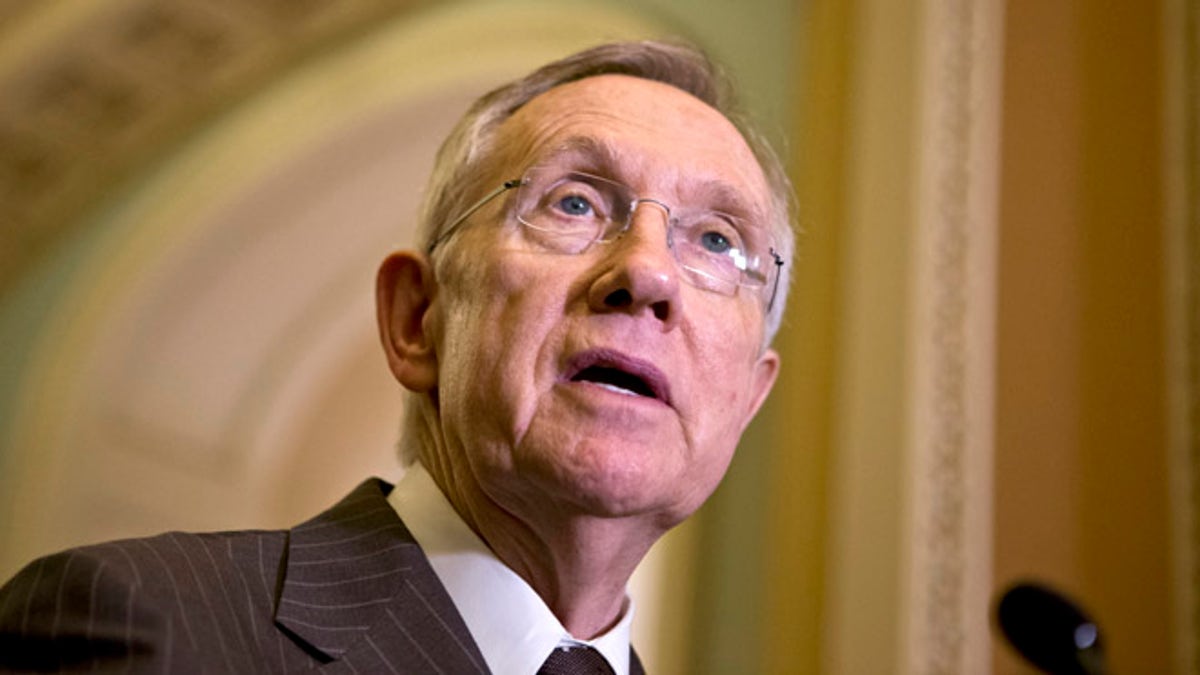
Dec. 11, 2012: Senate Majority Leader Harry Reid speaks with reporters on Capitol Hill in Washington. (AP)
Senate Democratic Leader Harry Reid splashed cold water on the prospects of reaching a budget deal by Christmas to avert sweeping tax hikes and spending cuts, saying "it's going to be extremely difficult" to do so by Dec. 25 -- even as the White House and House Republicans exchange offers and counter offers.
In response to an earlier offer from the White House, Michael Steel, spokesperson for House Speaker John Boehner, said they "sent the White House a counter-offer that would achieve tax and entitlement reform to solve our looming debt crisis and create more American jobs." Adding that Boehner is "waiting for the White House to identify what spending cuts the president is willing to make as part of the 'balanced approach' he promised the American people."
Further details on either offer have not been provided.
Earlier on Tuesday, Reid addressed the slow-moving talks over the looming fiscal crisis. In what initially appeared to be a sign of progress, Boehner and President Obama met at the White House over the weekend. But with Boehner and the White House continuing to complain about the other's lack of cooperation, it was clear that the meeting did not yield the makings of a deal.
Reid said there's still a chance at a deal by Christmas, but stressed the difficultly in moving the ball forward. He also stressed that even if a deal is reached soon, it takes time to move anything through both chambers.
- Three things Washington forgets about the fiscal crisis
- Obama, Boehner meet on fiscal crisis for first time in weeks
- Obama slams Michigan Republicans over union bill ahead of protests, votes
- New insurance fee in health overhaul law likely to hit consumers
- Deal or no deal, ObamaCare taxes poised to hit next month
- Court system braces for layoffs as clock on fiscal crisis ticks
"This is not something we can do easily," Reid said.
The comments underscore how close to the deadline lawmakers and the White House are taking negotiations. Without a deal on the president's desk by Jan. 1 -- let alone the makings of a deal by Christmas -- income and other taxes will rise on all Americans due to the expiration of the Bush-era rates.
Republicans on Tuesday claimed that in order to step toward an agreement, Obama needs to detail exactly what spending he would cut.
Boehner, speaking on the House floor, said the meeting at the White House Sunday afternoon was "cordial" -- but Republicans are "still waiting for the White House to identify what spending cuts the president is willing to make as part of the balanced approach that he promised the American people."
Boehner said he remains "hopeful" a deal can be reached, but said Obama has an "obligation" to put forward a new and specific plan if he objects to the plan Republicans proffered last week.
"The longer the White House slow-walks this process, the closer our economy gets to the fiscal cliff," he said. "We know that the president wants more stimulus spending and an increase in the debt limit without any cuts or reforms. That's not fixing our problem -- frankly, it's making it worse."
The White House, though, rejected Boehner's claims.
"The president, unlike any other party to these negotiations, has put forward detailed spending cuts as well as detailed revenue proposals," White House Press Secretary Jay Carney said Tuesday.
Boehner did not indicate whether he and his team are considering any changes to the Republican negotiating position. Boehner, while putting revenue on the table, has all along rejected Obama's demand that tax rates increase next year on the top 2 percent.
A few Republicans in both chambers, however, have urged Boehner to give the president what he wants on tax rates -- and focus energy on fighting for entitlement cuts. Without discussing taxes in great detail, Boehner and Senate Republican Leader Mitch McConnell both pressed Obama Tuesday for more details on possible cuts.
"The president seems to think that if all he talks about are taxes, and that's all reporters write about, somehow the rest of us will magically forget that government spending is completely out of control, and that he himself has been insisting on balance," McConnell said in remarks on the Senate floor.
The automatic tax increases and spending cuts will kick in after the first of the year, and economists have warned that they could plunge the nation into another recession.
The two sides, though, have struggled to reach a deal. Each has accused the other of being too vague with its plan. Just as Republicans are now pressing Obama for details on spending cuts, Obama has criticized Republicans for withholding details about which deductions they'd be willing to trim.
After Boehner spoke on the floor Tuesday, House Democratic Whip Steny Hoyer criticized Republicans for keeping that information quiet.
Further, House Democratic Leader Nancy Pelosi claimed Democrats had already agreed to cuts -- specifically, budget cuts contained in the 2011 bill that allowed the debt ceiling to rise.
"Where are the cuts? They're in bills that you, Mr. Speaker, have voted for," Pelosi said.
Pelosi went on to call for a vote on a bill that would let current rates expire for households making more than $250,000, while extending them for everyone else.
Republicans have opposed that bill. Boehner's plan, in addition to calling for $800 billion in new revenue, envisions $600 billion in savings over a decade from Medicare, Medicaid and other government health programs, as well as $300 billion from other benefit programs and another $300 billion from other domestic programs.
It would trim annual increases in Social Security payments to beneficiaries, and it calls for gradually raising the eligibility age for Medicare from 65 to 67, beginning in a decade.
The Associated Press contributed to this report.












































